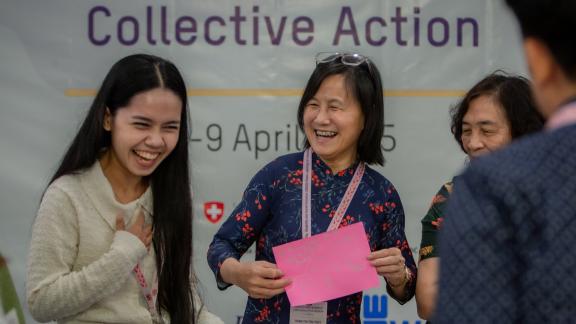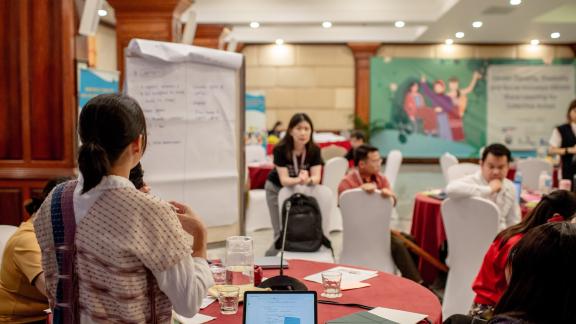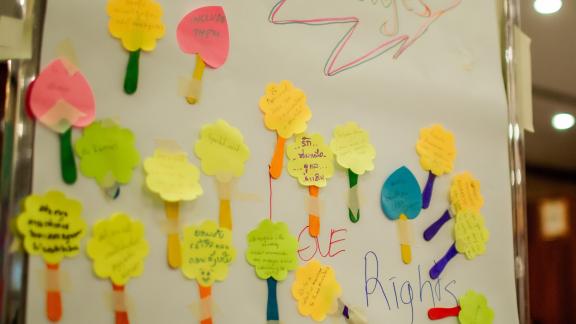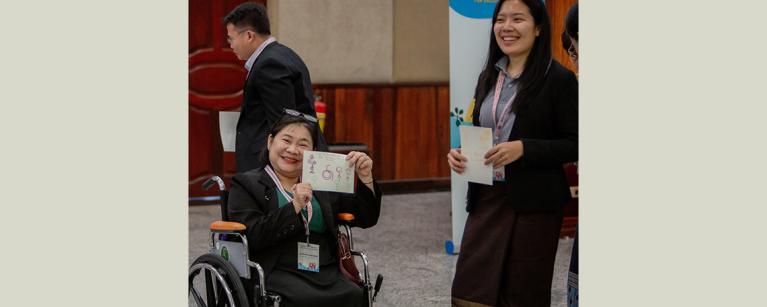In today’s world, where diversity, equity, and inclusion are often reduced to buzzwords—used for show, underfunded, or ignored—and where leaders sometimes dismiss gender and social inclusion as side issues, the recent Gender Equality and Social Inclusion (GEDSI) learning event under Oxfam Mekong Regional Water Governance Program offered a powerful reality check. Held in April 2025 under the hot sun of Siem Reap, this wasn’t just another regional workshop. It was a space where honest conversations and lived experiences took center stage, and the voices of those too often left unheard carried powerfully across borders.
What stood out from the start was the strength of intergenerational dialogue. Youth from Thailand, Lao PDR, Cambodia, and Vietnam sat alongside older colleagues, exchanging concerns about climate change and water governance alongside their personal experiences. As one young participant put it, “We learn from the elders, but we also bring our energy and ideas to keep the rivers alive.” A clear reminder: sustainable change happens when everyone has a seat at the table, and each voice is equally valued.

Intergenerational dialogue is vital for sharing wisdom, fostering empathy and facilitating learning across the generations. Young Cambodian participants are learning from the Vietnamese champion of disability inclusion.
In breakout discussions, youth participants emphasized why an intergenerational approach isn’t just helpful—it’s essential. A youth leader from Cambodia shared, "It’s our chance to raise concerns for both now and the future, and to learn from those who’ve already fought these battles." They highlighted the need to pass knowledge between generations and to use digital tools to spread messages about climate and water issues faster and further.
They also outlined what they need to take a more active role: safe, inclusive spaces to exchange ideas, capacity-building programs, and real opportunities to participate in decisions. Scholarships, exchanges, and mentorships were flagged as key. As they said, they’re ready to lead—but the doors need to be open.

All lived experiences are important when GEDSI recommendations are made. Young participants from Thailand confidently shared their thoughts and reflections on inclusive and practical communication considerations for youth and LGBTQI communities.
A powerful part of the workshop was the spotlight on disability inclusion in water governance. Participants living with disability shared their concerns and offered practical strategies. One issue echoed across countries: women with disability often face more intense discrimination and daily barriers than men. In many cases, support comes only from immediate family—often a mother. In Lao PDR, for example, the absence of a male relative, like a brother, can mean exclusion from community events altogether.
Their stories highlighted a deeper problem: the disconnect between government policy, public infrastructure, and social attitudes. While inclusion might be written into law, it’s missing in practice—seen in inaccessible toilets, unreachable water points, and emergency services that don’t account for people who need help to evacuate. And beyond physical access, there’s stigma. A Vietnamese representative from an association for People with Disability said, "If you don’t know about People with Disability, you don’t know how to react." Her message to NGOs and leaders was simple: real participation starts with presence. "Join their activities, be there, learn directly—only then will you know how to support."
Best practices were shared around communication, stressing it must be two-way and adapted to different needs—sign language, voice recordings, easy-to-read formats, and peer outreach. The key takeaway? Confidence grows through continued engagement. A one-off invitation means little. Belonging takes time.
This spirit of exchange and learning echoed across countries. People didn’t just speak—they listened and reflected. The SOGIESC (Sexual Orientation, Gender Identity and Expression, and Sex Characteristics) sessions were described as “eye-opening.” These issues are often surrounded by myths and stereotypes. Lao PDR delegates connected with Thai LGBTQI+ activists who, despite being unfairly targeted and discriminated against, continue advocating for dignity and recognition.
One LGBTQI+ leader from Thailand shared, "We’re not just fighting for marriage equality. We’re creating safe spaces in schools and communities, where LGBTQI+ youth can grow without fear and take part in shaping their future." Another voice, from Lao PDR, added, “We’re still fighting to have our identities accepted, but step by step, we’re building bridges—from pain to power.”
“Stories from Indigenous women revealed a common thread: many sacrificed parts of their lives—childhoods, education, safety, even freedom—to lead. But they are doing more than surviving; they are shaping the future. Their advice to younger generations was bold and clear: “Get the highest education you can. Speak up. Support other women. Step out of your comfort zone.” There was also careful wisdom: “Don’t care what others say. Don’t give up. Don’t lead alone—build networks. And don’t forget to care for yourself.””
They emphasized outreach through allies, peer networks, and visible role models who show that participation is possible. Messages and materials must confront stereotypes and celebrate diversity. These conversations made one thing clear: although the challenges may differ, communities across the region are discovering and exchanging practical tools and strategies to drive change together.
Indigenous women leaders from Cambodia and Thailand also took the spotlight. NangNoy, a Lao-Khmer leader from Ratanakiri province in Cambodia, spoke of her journey from a shy woman to a powerful advocate, leading river protection and engaging with authorities through evidence-based advocacy. Saengrawee, a Shan woman from northern Thailand, recalled the saying, “No matter how many times a hen crows, the day won’t lighten.” Yet she challenged expectations, pursued her education, and became a role model for young women.
As NangNoy said, “We must become role models—make our own decisions, live our own lives, and lift each other up.” Leadership often starts in small places: house balconies, riverside chats, village meetings—where women find the courage to speak.

The SOGIESC session inspired everyone with its safe, open and inclusive space. The atmosphere was undoubtedly positive, and this was the case throughout the entire event.
But the conversations didn’t stop at powerful stories. They moved into tough policy discussions—how to turn intention into real, on-the-ground change.
The clearest takeaway? GEDSI must be integrated into water governance not just in theory, but through policies and practices that actively include. That means shaping systems that meet the needs of People with Disability, creating safe spaces for LGBTQI+ communities, and placing Indigenous women at the heart of decision-making. It means youth aren’t just consulted but treated as equals with real power. And it means working across sectors to make sure no one is left behind.
The strength of the workshop was in how it wove together youth energy, disability rights, LGBTQI+ inclusion, and Indigenous women’s leadership, and linked it directly to policy. It reminded us: real progress comes from collective effort between governments, civil society, donors, the private sector, and communities.
But dialogue isn’t enough. Reflection is just the beginning—it must lead to action.
For those ready to act, consider this:
- Review your projects through a GEDSI lens. Are you collecting disaggregated data?
- Are marginalized voices shaping decisions, not just being asked?
- Is your communication accessible for People with Disability?
- Join GEDSI learning events and training.
- Build partnerships with youth, People with Disability, LGBTQI+ activists, and Indigenous women to co-create solutions.
- Advocate for policies that embed GEDSI in water governance.
- Support multi-stakeholder platforms where governments, experts, and communities co-design evidence-based, inclusive systems.
The rivers can’t wait—and neither can the people who depend on them. Now is the time to move from talk to collective, inclusive action.
Learn more about Oxfam’s work on Gender Equality, Disability, and Social Inclusion in the Mekong Water Governance Program at Oxfam in Asia.
Oxfam implements the Strengthening Climate Resilience in the Mekong Sub-region as part of the Mekong Regional Water Governance Program. It is a three-and-a-half-year project, supported by the Australian Government through the Department of Foreign Affairs and Trade. Oxfam and our partners (including non-government organisations, the private sector, universities and government departments) work with the communities of the Mekong River Basin at a national and regional level to make these changes happen.
All photos: Pimpisa Sriprasert, GEDSI Technical Consultant
